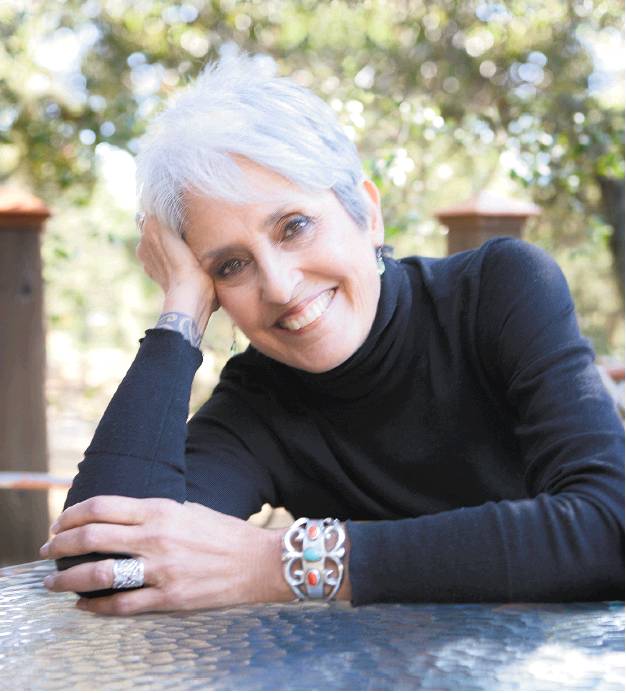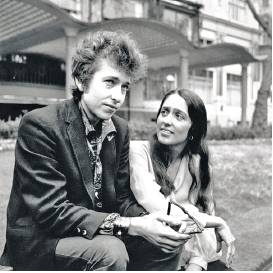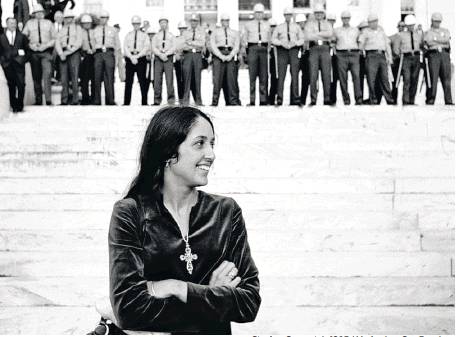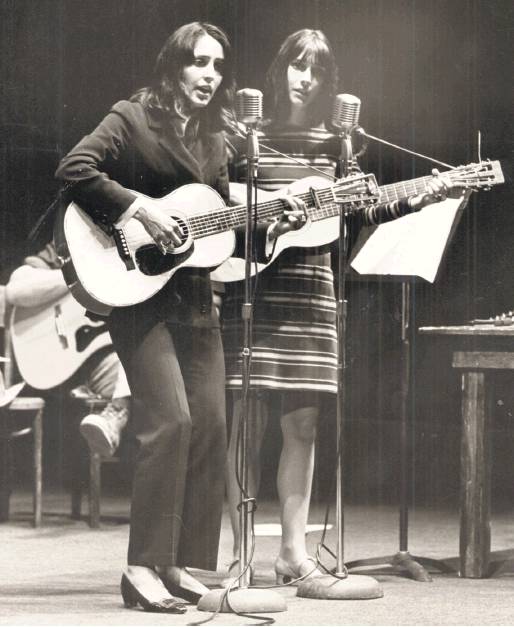Baez retiring, but not from activism
Singer changing focus after one last album, limited tour
By Aidin VaziriJoan Baez has made up her mind. After more than five decades of touring the world, singing for the faithful and serving as the torchbearer for ’60s protest music, she’s ready to call it quits. At her longtime Woodside home, the 76-year-old folk singer says she’s currently working on what will be her last album ever. “I will be so f— delighted to get it done,” Baez laughs. She says the album will feature her interpretations of songs by left-field pop artists like Tom Waits, Antony Hegarty and Josh Ritter. “It’s going to be beautiful,” she says, matter-of-factly. “It’s coming out next year, and we’ll call it ‘Fare Thee Well.’ ” This isn’t the first time Baez has threatened retirement.
She recalls an ongoing conversation she had with her mother, who died in 2013 at age 100: “When my mom was about 90, I told her I was going to quit and she said, ‘What will your fans think?’ ” Baez says. “A few years later when I told her the same thing she said, ‘Oh, honey, you’ve done enough.’ ”
Baez will be among the inductees at the Rock and Roll Hall of Fame’s 32nd annual induction ceremony, which takes place on Friday, April 7, at Barclays Center in Brooklyn. She’s clearly the odd one out in a class that includes the late rapper Tupac Shakur and square rockers Journey, Pearl Jam, Yes and Electric Light Orchestra.
“I think they were kind of torn because there was some pressure from people saying, ‘She’s not rock ’n’ roll,’ ” says Baez, whose own career opened the door for prior inductees such as Bob Dylan, the Byrds and Joni Mitchell. “I’ve had the most extraordinary types come up to me and say, ‘Your music meant so much to me!’ Guys with spiked hair and boots. There’s a connection that’s inevitable, and I’m proud of carrying my part of it.”
In terms of social impact, Baez’s influence is incomparable.
Born of Scottish and Mexican descent into a Quaker household in Staten Island, N.Y., she has used her music as a platform for the activism that was instilled in her at a young age. The Baez family moved to California, and Baez graduated from Palo Alto High School in 1958.
Baez made her debut at the Newport Folk Festival at age 19 in 1959. She was drawn to political voices at an early age, fixating on the music of Harry Belafonte and Pete Seeger.
Baez, who made the cover of Time magazine only four years into her career, not only was instrumental in introducing the world to Dylan but also served as a leading voice in the civil rights movement, marching on Washington alongside the Rev. Martin Luther King Jr., and appearing at countless rallies as part of the anti-Vietnam War movement.
Through the years, she has spent as much time advocating for justice, human rights and peace as she has scoring hits with her sublime renditions of the Band’s “The Night They Drove Old Dixie Down,” Dylan’s “It’s All Over Now, Baby Blue” and her own “Diamonds and Rust.”
“She was something else, almost too much to take,” Dylan said of Baez in a recent interview published on his website. “Her voice was like that of a siren from off some Greek island. Just the sound of it could put you into a spell. She was an enchantress. You’d have to get yourself strapped to the mast like Odysseus and plug up your ears so you wouldn’t hear her. She’d make you forget who you were.”
In other words, we have never needed her more.
Baez says that even though she plans to stop making records and touring, she will still show up when duty calls.
“Especially with (President) Trump in office, there’s going to be so much to do,” she says. “I go back and forth because he’s such a buffoon and you think, this can’t happen. Then I read a bunch of Hitler quotes and they just fit him like a glove. I need to be available for that kind of thing.”
Last month, Baez opened the San Francisco Women’s March with her acoustic guitar and “No Nos Moveran,” the Spanish version of the traditional folk song “We Shall Not Be Moved.” She dedicated Dylan’s “Forever Young” to Barack and Michelle Obama.
She says she was happy for the opportunity to participate in another emerging political movement — one she hasn’t seen the likes of in some 40 years — but the day conjured mixed emotions.
“It felt right and at the same time, I thought, I can’t believe I’m still doing this,” Baez says. “The emcee didn’t know who I was, and somebody told her hurriedly, so she said something like, ‘And our next performer has been doing this for hundreds of years!’ I thought, Jesus, do I look that old?”
She’s not entirely unfamiliar to Millennials.
In 2015, she became a member of Taylor Swift’s elite squad — joining the likes of supermodels Cara Delevingne and Gigi Hadid, tennis star Serena Williams and pop icons like Nick Jonas and Hailee Steinfeld — when the “Shake It Off” hit maker brought Baez onstage during her 1989 Tour stop at Levi’s Stadium in Santa Clara.
“She introduced me to 50,000 people and they all go, ‘Yay!’ ” Baez says. “But I’m sure a number of them went home and Googled me. It was very sweet.”
Mostly, it helped Baez impress her 13-year-old granddaughter, Jasmine Harris.
“Yes, I gained a number of points,” she says, laughing.
That same year, Baez was the recipient of Amnesty International’s highest honor, the Ambassador of Conscience Award, in 2015. Patti Smith presented the award.
“If the 16th century had Joan of Arc, we have Joan Baez,” she said, as part of her introduction.
Baez started seriously contemplating retirement about three years ago when she discovered it was getting more difficult to hit those crystalline high notes that defined her voice. She consulted with doctors, a vocal coach and a therapist. The conclusion was that after 57 years of public performance, her voice has simply changed, much to her dismay.
“It’s so difficult to sing and make it sound like anything I want to hear,” Baez says. “I can do it in the lower range, yeah, but it’s still not easy. Holding the voice up — it’s not just the vocal cord, it takes the whole body to do it. It takes a lot of effort.”
She says she just doesn’t have it in her anymore.
“Watch, I’ll quit singing and get fat,” she says.
An accomplished painter, she has plans for an art show in September. She’s also working on a documentary of her life (“I’ll be involved in it, not like the one on PBS,” she grouses). She also looks forward to traveling with Jasmine.
“I thought, I’m going to take this year off touring, and I’ve been busier than ever,” she says. “I have not missed one second of it this year.”
Baez has a few more live dates lined up for the summer, joining Mary Chapin Carpenter and the Indigo Girls’ Amy Ray and Emily Saliers on a limited tour as the supergroup Four Voices for what will be her last major outing.
She’s also excited about the forthcoming release of the three-CD box set, “The Complete Gold Castle Masters,” which collects material from her lesser-known albums “Recently” (originally released in 1987), “Diamonds and Rust in the Bullring” (a live recording from 1988) and “Speaking of Dreams” (1989).
“There are not a whole lot of my records I want to listen all the way through,” she said. “But I’m so happy they’re coming out. The voice is in peak shape.”
There’s no persuading her to carry on — and maybe it’s pointless anyway. As her mother said all those years ago, Baez has done enough — and then some.
“Well, I never set out to do anything,” she says. “When I was starting out, my idea of the future was the following Wednesday. I never planned any of it. I just played guitar and sang. For years, I insisted, ‘I’m not famous, I’m just well-known.’ Who was I kidding? I was on the cover of Time. I didn’t want to deal with fame. I didn’t want the responsibility. I just stuck with what it is I do.”
Aidin Vaziri is The San Francisco Chronicle’s pop music critic. Email: avaziri@sfchronicle.com Twitter: @MusicSF



